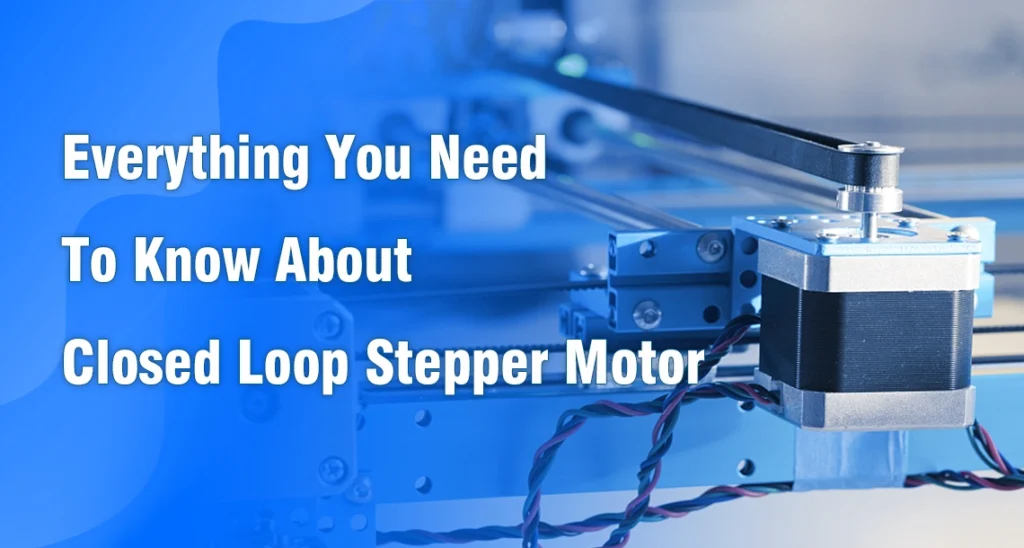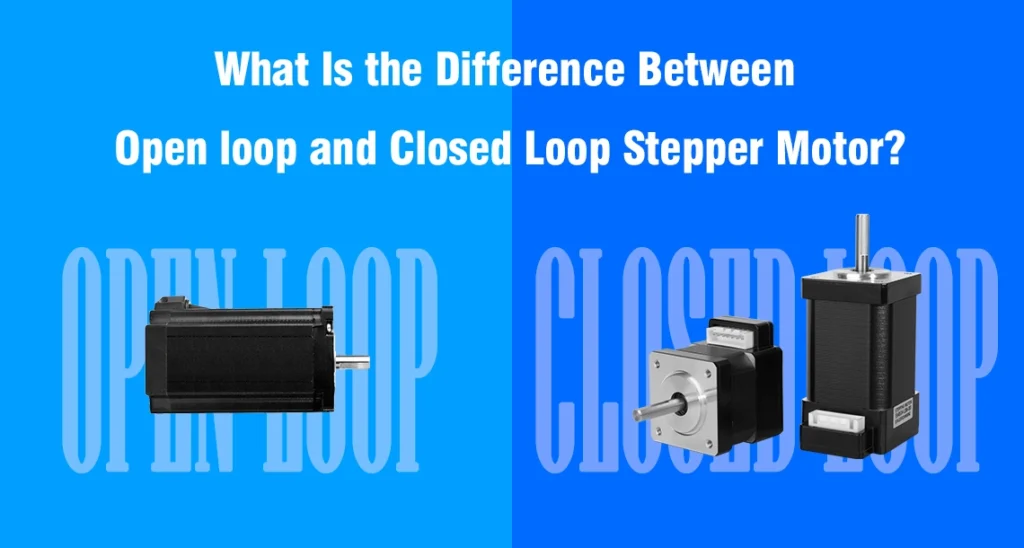Selecting the ideal closed loop stepper motor is critical for ensuring optimal performance and efficiency in various applications. In this guide, we’ll delve into the essential factors you must consider when choosing the perfect closed loop stepper motor. Whether you’re a seasoned engineer or a novice enthusiast, these factors will help you make an informed decision and achieve superior results in your projects.
1. Torque Requirements of Closed Loop Stepper Motor
To begin with, assess the torque requirements of your application. Take into account both the ongoing torque necessary for consistent operation and the maximum torque required for occasional surges in power. Whether your application requires a steady torque output or occasional bursts of power, having a clear understanding of these requirements is crucial for maximizing motor performance.
Continuous torque is vital for maintaining steady operation, while peak torque handles intermittent increases in power demand. By accurately gauging your torque requirements, you can select a motor that provides the required performance without putting undue strain on your system, ensuring reliable operation.
2. Step Resolution
Step resolution refers to the smallest angular movement that the motor can achieve. Higher step resolution enables finer control and smoother motion, especially in precision applications such as 3D printing or CNC machining. Evaluate your application’s resolution requirements to ensure compatibility with the selected motor.
Step resolution plays a pivotal role in achieving precise motion control in various applications. Whether you’re operating a 3D printer, CNC machine, or robotic arm, the ability to execute fine movements is essential for optimal performance. By considering your application’s resolution requirements, you can select a closed loop stepper motor that offers the necessary level of precision. Higher step resolution translates to smoother motion and improved accuracy, enhancing the quality of your end products.
3. Speed Range of Closed Loop Stepper Motor
Analyze the speed range within which your application operates. Different closed loop stepper motors have varying speed capabilities, and selecting one that aligns with your application’s speed requirements is crucial for achieving desired performance levels.
Whether you need high-speed operation or precise low-speed control, choose a motor that meets your speed criteria. By matching the motor’s speed range to your application’s requirements, you can ensure smooth operation and optimal performance across a variety of operating conditions.
4. Physical Size and Weight of Closed Loop Stepper Motor
Consider the physical dimensions and weight of the motor, ensuring compatibility with your application’s space constraints. Whether you’re integrating the motor into a compact robotic arm or a larger industrial machine, choosing a motor that fits seamlessly within the allotted space is essential.
Additionally, you also need to consider the motor’s weight to prevent undue stress on supporting structures and ensure optimal performance. By prioritizing size and weight compatibility, you can streamline the integration process and achieve efficient operation in your application.
5. Environmental Conditions
Evaluate the environmental conditions in which the motor will operate, including temperature, humidity, and exposure to dust or contaminants. Whether your application operates in extreme temperatures, high humidity, or dusty environments, choosing a motor with the appropriate protection ratings is essential.
Robust construction and sealing mechanisms safeguard the motor against environmental hazards, ensuring consistent performance and prolonged lifespan. By accounting for environmental factors, you can select a motor that thrives in your application’s specific operating conditions.
6. Integration with Control System
Assess the compatibility of the closed loop stepper motor with your existing control system or the feasibility of integrating it into a new setup.
Verify communication protocols, voltage requirements, and other interface parameters to ensure smooth operation and optimal functionality. By prioritizing compatibility, you can streamline the integration process and avoid potential issues that may arise from mismatched components.
7. Power Supply Requirements
Consider the power supply requirements of the closed loop stepper motor, including voltage and current specifications.
Whether your application operates on standard voltages or requires specialized power infrastructure, choosing a motor with the appropriate voltage and current specifications is crucial. By aligning the motor’s power requirements with your existing setup, you can prevent overloading, voltage instability, and other power-related issues, ensuring reliable operation and longevity.
8. Feedback Mechanism
Evaluate the feedback mechanism incorporated into the closed loop stepper motor, such as encoders or resolvers. Feedback systems provide real-time position information, enabling precise control and accurate motion tracking. Select a motor with a feedback mechanism that suits your application’s requirements for enhanced performance and reliability.
9. Cost-effectiveness of Closed Loop Stepper Motor
Balance performance requirements with budgetary constraints to ensure cost-effectiveness.
While high-performance motors may entail a higher upfront investment, they often deliver superior reliability and functionality, resulting in long-term cost savings. Consider the total cost of ownership, including maintenance and operational expenses, to evaluate the cost-effectiveness of different motor options. By prioritizing value and long-term benefits, you can make an informed decision that aligns with your budgetary requirements and performance goals.
10. Reliability and Durability
Prioritize reliability and durability when choosing a closed loop stepper motor to ensure consistent performance and minimal downtime.
Investing in a motor with quality construction and robust components pays dividends in terms of reliability and performance. Reputable manufacturers subject their motors to rigorous testing to ensure durability and consistency across diverse operating conditions. By prioritizing reliability, you can minimize downtime, enhance productivity, and achieve long-term success in your application.
FAQs of Closed Loop Stepper Motor
- Can I use an open loop stepper motor instead of a closed loop stepper motor?
While open loop stepper motors are suitable for many applications, closed loop stepper motors offer enhanced performance and accuracy, especially in demanding scenarios where precise motion control is essential.
- What are the benefits of using a closed loop stepper motor?
Closed loop stepper motors provide real-time feedback and correction, resulting in improved accuracy, stability, and reliability compared to open loop systems.
- How do I determine the torque requirements for my application?
Assess the load characteristics, acceleration requirements, and operating conditions to calculate the required torque for your application accurately.
- What is step resolution, and why is it important?
Step resolution refers to the smallest incremental movement that a motor can achieve, influencing the precision and smoothness of motion in various applications.
- What factors affect the resolution of a closed-loop stepper motor?
The resolution of a closed-loop stepper motor is influenced by factors such as the encoder feedback resolution, microstepping configuration, and mechanical design. Higher encoder resolutions and finer microstepping settings result in greater resolution and smoother motion.
- Are closed loop stepper motors suitable for high-speed applications?
Yes, many closed loop stepper motors offer high-speed capabilities while maintaining accuracy and stability, making them suitable for a wide range of applications.
- How do I ensure compatibility between the closed loop stepper motor and my control system?
Verify communication protocols, voltage requirements, and interface compatibility to ensure seamless integration and optimal performance.
- Can I replace an open loop stepper motor with a closed loop stepper motor in my existing system?
Yes, in many cases, you can replace an open-loop stepper motor with a closed loop stepper motor, provided that the system’s control architecture supports closed-loop operation and the motor’s specifications meet the application requirements.
- What are the main benefits of using closed loop stepper motors?
- Precise Positioning: Closed loop systems provide real-time feedback, allowing for precise positioning and accurate motion control.
- Improved Performance: With feedback mechanisms, closed-loop stepper motors offer enhanced performance, stability, and responsiveness.
- Error Correction: The ability to detect and correct errors in position minimizes the risk of inaccuracies and ensures consistent operation.
- Simplified Setup: Closed loop stepper motors often feature plug-and-play functionality, simplifying setup and integration into existing systems.
- Cost-Effective Solution: Compared to servo systems, closed-loop stepper motors typically offer a more cost-effective solution for applications requiring moderate precision and control.
Conclusion
Selecting the proper closed loop stepper motor is a critical decision that can significantly impact the performance and efficiency of your application. By considering factors such as torque requirements, step resolution, speed range, and environmental conditions, you can make an informed choice that aligns with your specific needs and objectives.
Remember to prioritize reliability, durability, and cost-effectiveness to maximize the long-term value of your investment. With the right closed loop stepper motor, you can achieve superior results and propel your projects to new heights of success.



